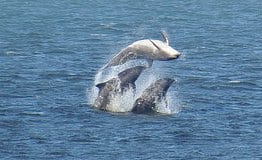Marine
Predicting the impact of underwater noise on marine mammals
October 13, 2017 by Marine Scotland Communications No Comments | Category Collaborations, Marine Directorate general, Marine Directorate Science, Publications
 Marine mammals, such as seals and dolphins, are sensitive to underwater noise and other disturbances which can affect their ability to forage or communicate. Our understanding of the effects of these pressures on marine mammal, and of how to assess and quantify potential impacts on populations, is rapidly evolving.
Marine mammals, such as seals and dolphins, are sensitive to underwater noise and other disturbances which can affect their ability to forage or communicate. Our understanding of the effects of these pressures on marine mammal, and of how to assess and quantify potential impacts on populations, is rapidly evolving.
One tool that can be used to assess potential impacts of disturbance on marine mammal populations is the iPCoD (Interim Population Consequences of Disturbance) model. It was developed by SMRU Consulting and the University of St Andrews in 2013 and released by Marine Scotland in 2014. It considers the consequences of disturbance, hearing damage or collisions that might result from the construction or operation of offshore renewable energy devices. Marine Scotland is happy to announce that in keeping with our evolving understanding of effects of underwater noise, and how to assess them, we have recently published an update to the iPCoD model.
The newly released iPCoD model (version 3) is an update developed by SMRU Consulting, the University of St. Andrews, and Marine Scotland.
This update mainly contains improvements and developments such as:
- improvements to run-time
- flexibility in the way the effects of the persistence of disturbance are modelled
- provision to specify different effects for animals close to the noise source and those further away
- simplified data entry and a number of other smaller improvements
The download file contains the R code required to run the model as well as a new helpfile.
Further Information
- Look at the iPCoD (Interim Population Consequences of Disturbance) model.
- Read the previous blog about a report on approaches for modelling harbour seal movement
Tags: renewables, seal, SMRU


Leave a comment